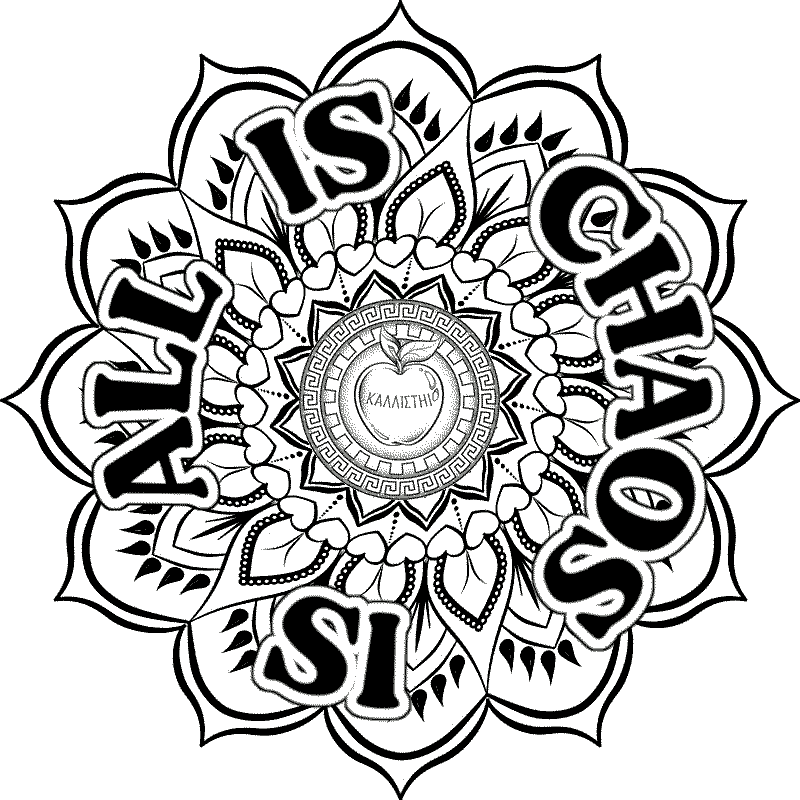





Transmissions from the Chaos Buddha began as a personal spiritual journal, a sort of combination rant and stream-of-consciousness deconstruction of everything I know and believe, leaning heavily into the ridiculous and absurd, to find out which parts are true.
Why would I do this? Well, I was in a cult for a little bit. Now, don't get me wrong. I didn't grow up in this cult, I didn't lose a large percentage of my life to it, I didn't lose my family, and I didn't suffer any abuse. When it comes to people who were in cults, I had it pretty easy. But still, damage was done, and most of that damage had to do with my own sense of identity, and how that identity coexisted with my spirituality.
The cult I was in practiced Krishna devotion, called Bhakti. Without going into too much detail, suffice to say that the group I was in discourages thinking for one's self, and demands a rigorous practice that encompasses one's entire being. There was not a moment of every day when I was not thinking about my practice and my devotion - and comparing myself to the practice and devotion of others, usually unfavorably. This practice weaponizes discipline and aims devotees at each other in a purity contest. There were many days when I thought I was worthless due to my inability to practice the way I wanted. All while being taught to deny reality and never question my guru. I was taught anti-science beliefs and backwards views of human sexuality and, because I liked the practice, I am embarrassed to say that I bought in, at least until the cognitive dissonance became too much to bear.
Why did I like the practice? Simple: it works. The practice is easy. Recite a mantra. Chant it incessantly, but do 16 dedicated rounds of 108 repetitions each without fail. And if you're already doing 16 rounds, chant more. You have the time, clearly. Always be chanting! Why does this work? It's self-hypnosis. Chanting anything with this kind of intensity, while thinking thoughts of loving devotion, will induce a kind of euphoric trance. That's what devotees experience, and what they become addicted to. It certainly is blissful; if it wasn't I wouldn't have given up my whole identity for it. I left the organization first, but kept the restrictions and practice. I studied with an independent Bhakti teacher, but the cognitive dissonance was insurmountable, so I left the practice entirely.
After leaving I studied with a number of teachers - I wanted to stay in Dharmic religion, so I meditated with a Zen priest for a while, and eventually found a virtual Sangha for secular Buddhists. Here I formally took refuge as a Buddhist and received my first Dharma name. However, soon after I found that familiar sense of unease. After being in a cult and making my spiritual practice my entire identity, I was looking for something to fill that very large hole left when I abandoned Bhakti practice. I wasn't really searching for a spiritual practice or a sangha or a teacher, I was looking for an identity, because without Bhakti I didn't know who I was anymore.
I started attending a Buddhist temple which practiced Jodo Shinshu, a form of Pure Land Buddhism. One Sunday, the speaker giving the Dharma talk gave us an instruction which blew my mind. "Write your own sutra," he said. Do as others have done in so many sutras - come to the Buddha with a question, and see how he answers. I wanted to do that. Maybe it would tell me who I really am.
So, I took my spiritual identity, and I threw it all out - I forgot everything that I knew about my practice, I abandoned all of my habits and questioned everything. I took the time to rediscover myself: the music I liked, my sense of humor, my delight in irreverence. I explored world religions and eventually came around to the Principia Discordia which had once changed the way I thought about religion and spirituality, and in its absurdity found a familiar warmth, and a path forward. I would write my own Sutra, and it would be Discordian.
I started to write. I began by taking apart my entire sense of self as a spiritual person, and reconstructing it using only the absurd. While the imagery and language are ridiculous, I wanted to delve into my thoughts, to distill my spiritual ideas to a few core principles which I knew to be true. The actual truth is recognizable even in cacophony, so I leaned hard into nonsense, and watched as truth emerged. The result became Transmissions, an absurdist, Discordian spin on Buddhist thought and practice. This is Buddhism passed through the lens of the ridiculous; it is composed of pure idea, uncolored by adherence to dogma, canon, or lineage, unafraid to be silly, delighting in irreverence, and deeply, profoundly meaningful for me.
The driving ideas of this work, perhaps unsurprisingly, is the rejection of spiritual authority and the eschewing of vows, along with the assertion that this existence is fundamentally meaningless. It posits that primordial chaos may be seen as the immutable origin, destination, and true nature of all observed reality, with the slogan "All is Chaos. Chaos is all. Listen."
I don't know that anyone will ever find it as meaningful to read as it was for me to produce, but I will share it freely nonetheless. I hope you enjoy it.
--Tin the Meaningless
